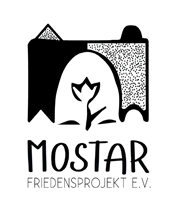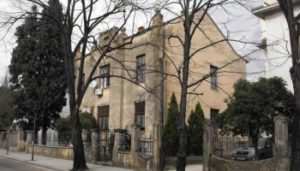Mostar Friedensprojekt e.V. (MFP) is, since 1994, a registered non-governmental and a non-for-profit organization with charitable commitments in the state of Brandenburg, located with its head office in the city center of Potsdam. Additionally Mostar Friedensprojekt is registered as Mostar Mirovni Projekt since 1994 in Mostar and since 1995 in Sarajevo as humanitarian organisation under the auspices of the Federation BiH ministry of social affairs.
Its head office in Bosnia is in Kljuc, where we have built up an own infrastructure. The association organizes socio-cultural activities, artistic and cultural events and cultural publications at the local, national and international level. It has offered for many years information, general support, advice, logistic and humanitarian aid, job qualifications and consultancy to refugees and asylum seekers in the region of Brandenburg and Berlin.
Mostar Friedensproject is constantly coordinating and leading youth exchanges, European Voluntary Service, trainings, conferences, events and other support facilities within the framework of the European program Youth, Grundtvig, Europe for Citizen and LiFelong Learning. The association has the partners in many European countries, particularly in the Western Balkan, East Europe and the Caucasus. The most important aims and objectives of Mostar Friedensprojekt are to encourage and promote young people to commit to an active involvement in the democratic fight against racism and xenophobia, to stand up against prejudices and social exclusion in Germany and in Europe , especially South East Europe.
The association develops new forms and methods of inter-cultural learning for political-social-cultural issues, which we promote with our partners in many countries of Europe. We actively promote the ideals fo tolerance and the understanding for the diversity of culture and social behaviours. We do political education at the local and regional level, in Brandenburg and Berlin. One of the most important objectives of Mostar Friedensprojekt from its foundations is to stirr the debate about totalitarism in Europe in the twentieth century.
We have held several conferences focused on “European memory / remembrance culture(s)” and about the ways European national states are dealing with their National Socialist and Stalinist past. Mostar Friedensprojekt e.V. established and ran and still runs several projects in Bosnia-Herzegovina including a neighbourhood centre in Mostar, a center for physical theraphy and rehabilitation, a workshop for the manufacture of prosthesis for land mine victims and a center for international youth encounters in Kljuc, Bosnia and Herzegovina.
The History and our Background
START OF THE BALKAN WARS 1991
We know where we come from! … we were students on the verge of becoming scientists and professionals in our future jobs. Our roots were at the Free University of Berlin, when the iron curtain came down and gave freedom to Hungary, Romania, Bulgaria and Albania. We were present, when the war broke out in the Western Balkans, when Yugoslavia disassembled into Slovenia, Croatia, Serbia and Montenegro, Bosnia and Herzegovina, Macedonia and Kosovo. In the Winter of 1992 we initiated a string of conferences dedicated to the multiple complexes of war in the Western Balkans. We called it “Balkan Kontrovers” and we did, what intellectuals do – we published.
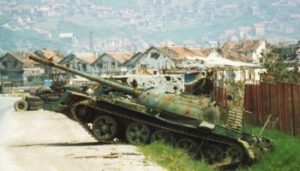
Peace Movement „Initiative zur Unterstützung der Friedensbewegungen in(m ehmaligen) Jugoslawien“
We became peace activists of the first hours. Stimulated by the initiative of Hilde Schramm and Bosiljka Schedlich a dedicated group of young and old assembled in the peace center of the Martin-Niemöller-Haus in Pacelliallee, Berlin, each week. In the discussions around the table we analyzed the course and the causes of war in Yugoslavia. We connected with the all-German peace movement that had emerged from the Easter marches against rearmament in the 1960s, its demonstrations against nuclear power in the 1970s and against the stationing of cruise missiles in the 1980s. We learned to say the words “former Yugoslavia”. We witnessed the break of the Green party into interventionists and pacifists. We learned to go from discussion to information to agitation to actions. We learned to work with media, with parties, with local communities, with international organisations and with … armies.
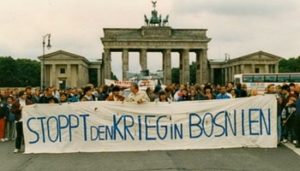
Keine Mauer durch Sarajevo Working together to help!
– “No wall through Sarajevo” – Berliner Appell: Keine Mauer durch ! 23.7.1993 We became humanitarian activists and learned to network and to lobby for humanitarian actions that help and change the situation on the ground. In 1993 we convinced the Berlin Parliament to support our initiative “No Wall through Sarajevo”. We received an office in the premises of Berlin’s Alternative List in Kreuzberg with two phones. Two jobs were sponsored by the local parliamentarians of Alternative Liste and by the federal and the EU parliament delegates of the Die Grünen/Bündnis90. The mayors of all districts of Berlin called the population to give and to give and to give. Berlin’s police carried the goods with their transporters to Spandau. Deutsche Post supplied us with thousands of standardized yellow packages. Bosnian Red Cross organized a hall in Spandau and dozens of refugees from Bosnia from asylum homes began to sort humanitarian goods. German Bundeswehr drove the ready-made packages to the U.S. air force base in Frankfurt/Main. International air force carried it by air to the NATO air force base Aviano, Italy, and parachuted the humanitarian aid into enclosed pockets in Eastern Bosnia, especially to Maglaj and Tuzla. Pharmaceuts and doctors all over Germany collected medicine, with hired trucks we drove it down to Metkovic into the German humanitarian aid center, forwarded the goods guarded by refugees and German peace activists through the lines of the warring factions to Sarajevo, Middle Bosnia, Tuzla. Post-communists in the Berlin Parliament were excluded from our intiative “No Wall through Sarajevo”. So we connected them with the Socialist Workers’ Movement and supported their “Hellersdorf hilft Tuzla” initiative, which brought their trucks in the end into the beleaguered city of Tuzla. Activists: Fazlagic, Jasna Malkoc, Ronni …
,
“Washingtoner Agreement”
Neighbour Center Liska Ulica In the years 1994 – 2001 MFP rented and rebuild a House in Liska Ulica as future Community Center Mostar
Brandenburg hilft Bosnia
Dayton Agreement Paris Agreement
Meet Our Team
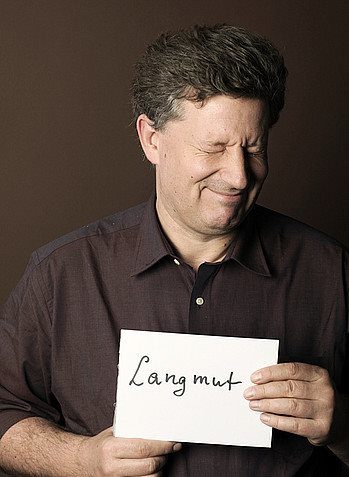
EGGERT HARDTEN
HEAD OF BOARDBoard Member of Mostar Friedensprojekt and Senior Analyst at European Stability Initiative (ESI)
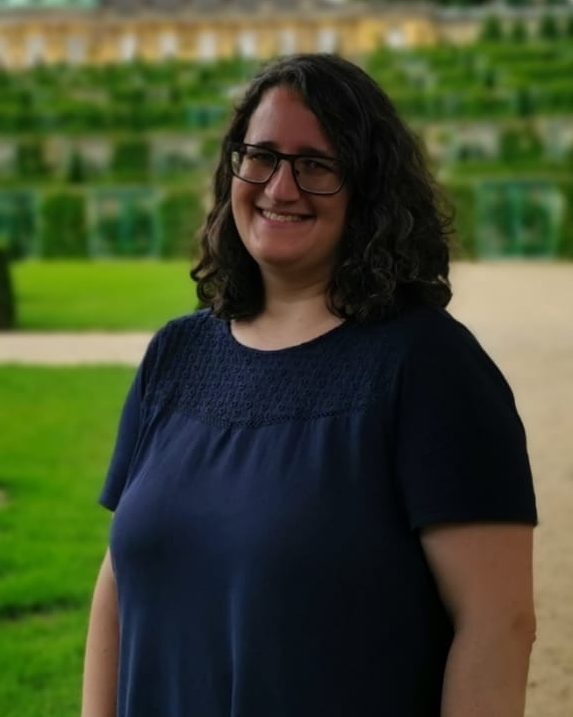
Manuela Demel
MEMBER OF THE BOARDBoard member, Workshop Facilitator and Projektmanager at pewobe g GmbH
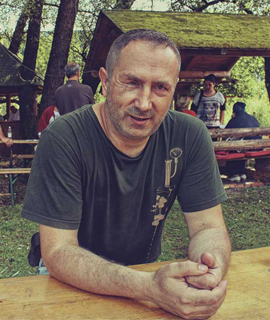
EMIL BENDER
MEMBER OF THE BOARDBoard member, treasury and Logistics responsible
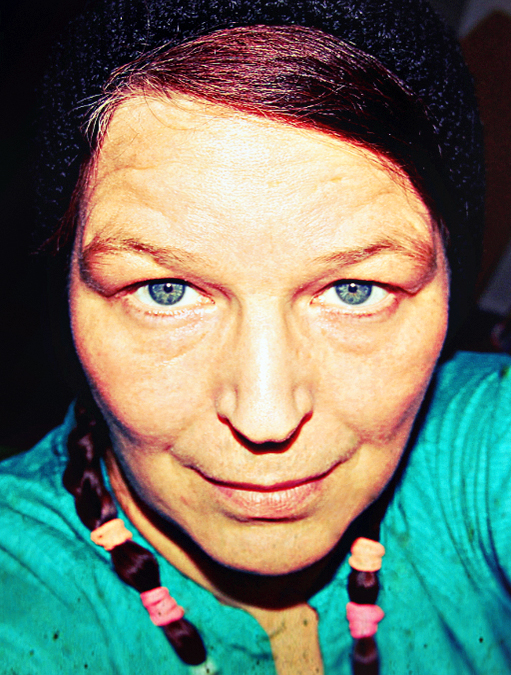
PETRA PATZWALDT
TrainerTrainer, Webdesign and Artist
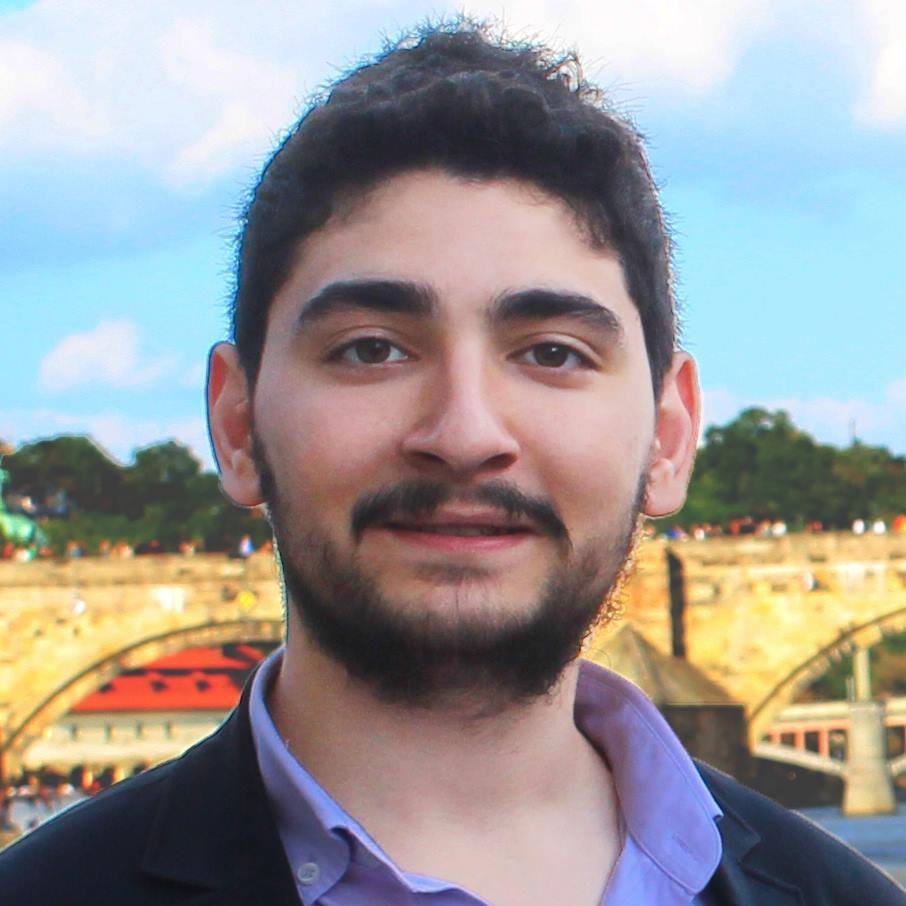
Çağrı Pehlivan
MEMBER OF THE BOARDBoard Member and Technical support
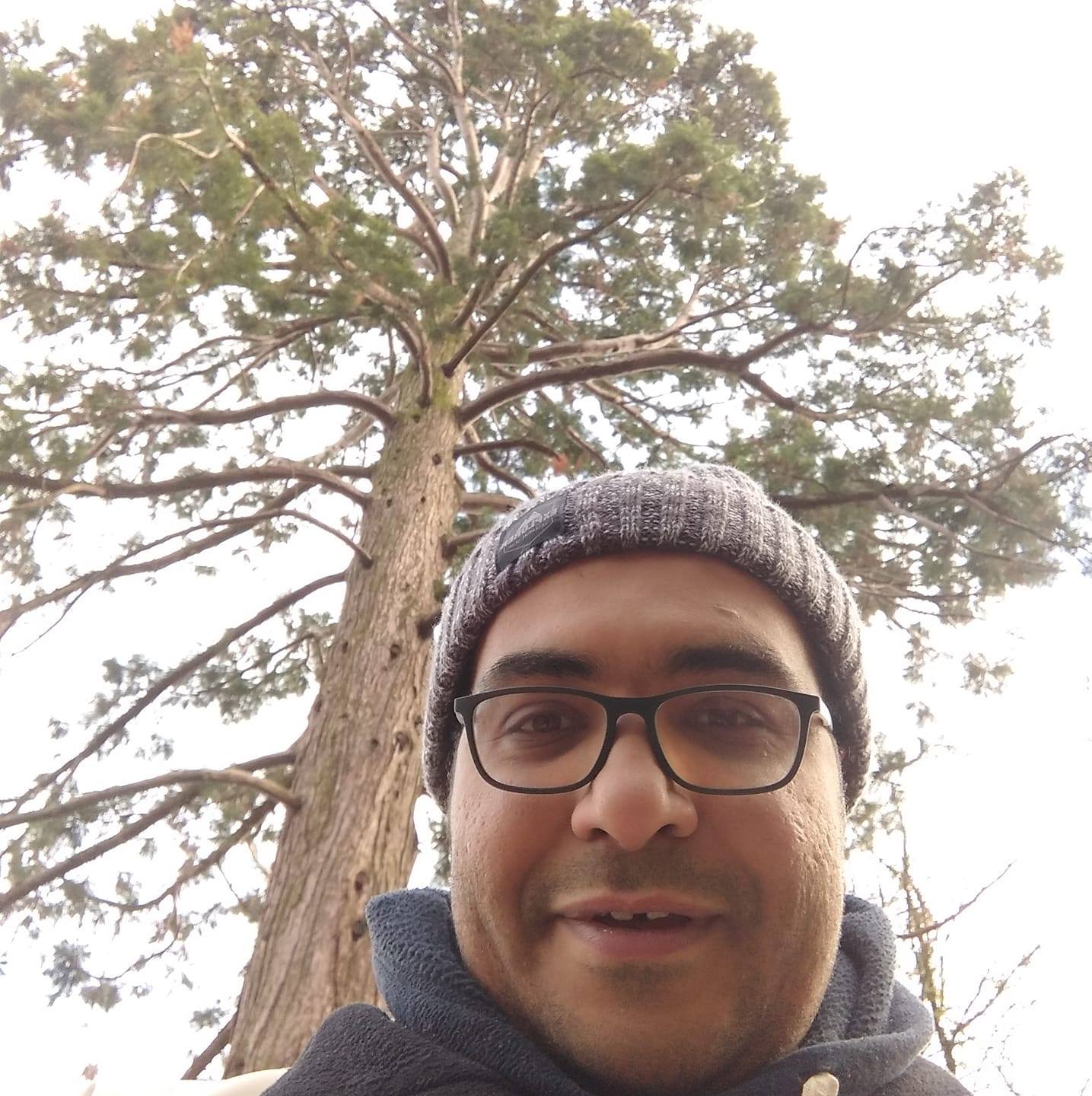
Hany Moussa
Organization MemberWorkshop Facilitator
